Technical information
Result
Products and construction methods applicable to 「Base Course / Subgrade / Road Body」
Refine further
(8 items)
-
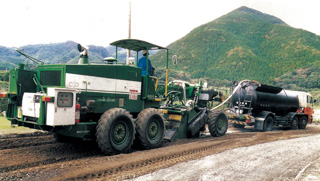
Cold in-place Recycling with Foamed Bitumen FOAMED FRB
Recycling method for promoting environmental conservation and reducing costs
This is a cold in-place recycling method that reclaims old existing asphalt and base course by mixing foamed asphalt and a small amount of cement, and reuses it as a base course for new pavement. This is a more economical pavement repair method than the in-place base recycling using asphalt emulsion or the pavement replacing.
-
Feature mark :





-
Category :
-
Paving Methods > Roadway > Maintain / Repair >
-
Feature mark :
-
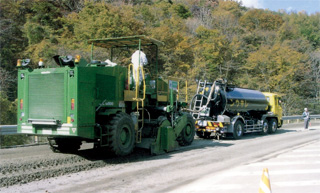
Cold in-place recycling of Consolidated Road Base SUPER FRB
Reclaiming damaged reclaimed base with "Road Recycler"
This is a cold in-place recycling method that reclaims the damaged old base courase which was firmly consolidated due to previous stabilization. The high-performance stabilizer “Road Recycler” can efficiently crush and mix such consolidated existing base courase, which is difficult to do with conventional road stabilizers.
-
Feature mark :





-
Category :
-
Paving Methods > Roadway > Maintain / Repair >
-
Feature mark :
-
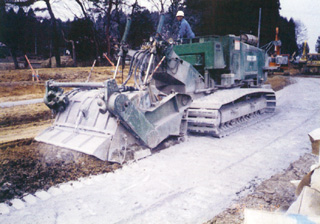
Cold In-place (In situ) Recycling FRB
Economical and environmentally friendly as it reuses existing asphalt pavement.
This is a cold-in-place recycling method in which aged asphalt pavement that has developed alligator cracks is crushed in-place and mixed with the underlying road base material while adding cement, etc. to create a new stabilized base courase.
-
Feature mark :





-
Category :
-
Paving Methods > Roadway > Maintain / Repair >
-
Feature mark :
-
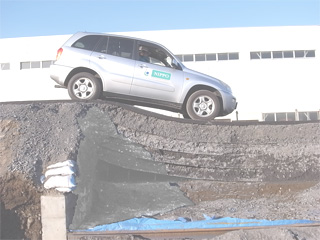
Step Preventive Pavement HRB
Prevents pavements from collapsing in an earthquake
This construction method involves building a composite rigid layer on the subgrade using a high-strength geo-grid and restraining members. It prevents the pavement from collapsing due to an earthquake and inhibits the formation of cracks and bumps in the asphalt pavement road surface. This allows emergency vehicles to travel on the road immediately after an earthquake, thereby helping to accelerate the initial response to any urgent call to save lives and transport supplies.
-
Feature mark :



-
Category :
-
Paving Methods > Roadway > Subsidence Measures >
-
Feature mark :
-
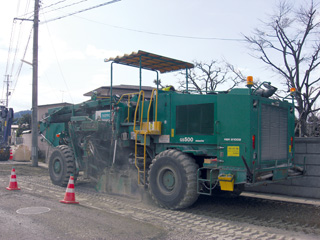
Soil Stabilization BASE-STABI
For strengthening the road base, improving the subgrade, and taking soft-ground measures with a treatment thickness of 30 cm or less
This is a construction method that stabilizes the existing road base by adding and mixing cement and lime in situ. The finished thickness of one layer is 10 to 30 cm.
-
Feature mark :



-
Category :
-
Paving Methods > Sub-grade / Base > Stabilization >
-
Feature mark :
-
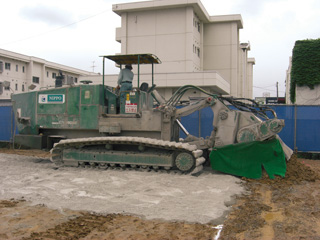
Subgrade Soil Stabilization DEEP-STABI
For strengthening the road base, improving the subgrade, and taking soft-ground measures with a treatment thickness of 30 to 100 cm
This is a construction method that stabilizes the existing subgrade soil by adding and mixing cement and lime in situ. The finished thickness of one layer is 30 to 100 cm.
-
Feature mark :



-
Category :
-
Paving Methods > Sub-grade / Base > Stabilization >
-
Feature mark :
-
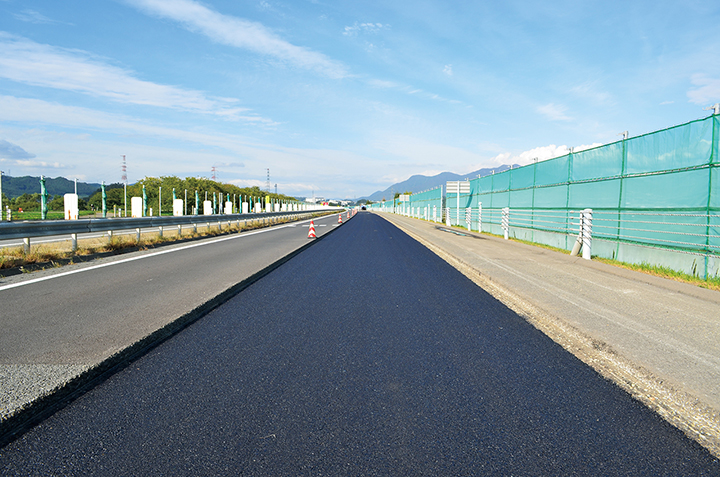
High Modullus Asphalt (EME) HIGHRIGID BASE
Hard and durable road base using a highly rigid asphalt mixture
This is a road base material which is made using a highly rigid asphalt mixture. Because the rigidity is much greater than that of ordinary road base, the load on the existing subbase is reduced, the asphalt pavement can be rendered more durable, and its service life can be extended.
-
Feature mark :


-
Category :
-
Paving Methods > Sub-grade / Base > Construction technology >
-
Feature mark :
-
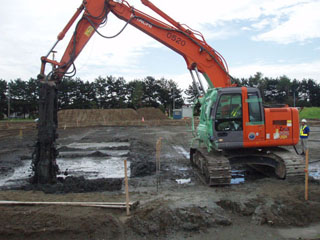
Shallow Layer Mixing Treatment Method MAD-STABI
A shallow layer-mixing treatment method for super soft ground and sludge stabilization
This is a construction method for mixing and stabilizing the shallow layer of the ground (up to 1.5 meters deep) with a multi-mixer or bucket mixer while adding a solidifier to soft ground.
-
Feature mark :

-
Category :
-
Civil Engineering > Ground Improvement / Embankments >
-
Feature mark :
| Common name | Product name | Overview |
|---|---|---|
| Cold in-place Recycling with Foamed Bitumen | FOAMED FRB | This is a cold in-place recycling method that reclaims old existing asphalt and base course by mixing foamed asphalt and a small amount of cement, and reuses it as a base course for new pavement. This is a more economical pavement repair method than the in-place base recycling using asphalt emulsion or the pavement replacing. |
| Cold in-place recycling of Consolidated Road Base | SUPER FRB | This is a cold in-place recycling method that reclaims the damaged old base courase which was firmly consolidated due to previous stabilization. The high-performance stabilizer “Road Recycler” can efficiently crush and mix such consolidated existing base courase, which is difficult to do with conventional road stabilizers. |
| Cold In-place (In situ) Recycling | FRB | This is a cold-in-place recycling method in which aged asphalt pavement that has developed alligator cracks is crushed in-place and mixed with the underlying road base material while adding cement, etc. to create a new stabilized base courase. |
| Step Preventive Pavement | HRB | This construction method involves building a composite rigid layer on the subgrade using a high-strength geo-grid and restraining members. It prevents the pavement from collapsing due to an earthquake and inhibits the formation of cracks and bumps in the asphalt pavement road surface. This allows emergency vehicles to travel on the road immediately after an earthquake, thereby helping to accelerate the initial response to any urgent call to save lives and transport supplies. |
| Soil Stabilization | BASE-STABI | This is a construction method that stabilizes the existing road base by adding and mixing cement and lime in situ. The finished thickness of one layer is 10 to 30 cm. |
| Subgrade Soil Stabilization | DEEP-STABI | This is a construction method that stabilizes the existing subgrade soil by adding and mixing cement and lime in situ. The finished thickness of one layer is 30 to 100 cm. |
| High Modullus Asphalt (EME) | HIGHRIGID BASE | This is a road base material which is made using a highly rigid asphalt mixture. Because the rigidity is much greater than that of ordinary road base, the load on the existing subbase is reduced, the asphalt pavement can be rendered more durable, and its service life can be extended. |
| Shallow Layer Mixing Treatment Method | MAD-STABI | This is a construction method for mixing and stabilizing the shallow layer of the ground (up to 1.5 meters deep) with a multi-mixer or bucket mixer while adding a solidifier to soft ground. |
(8 items)
